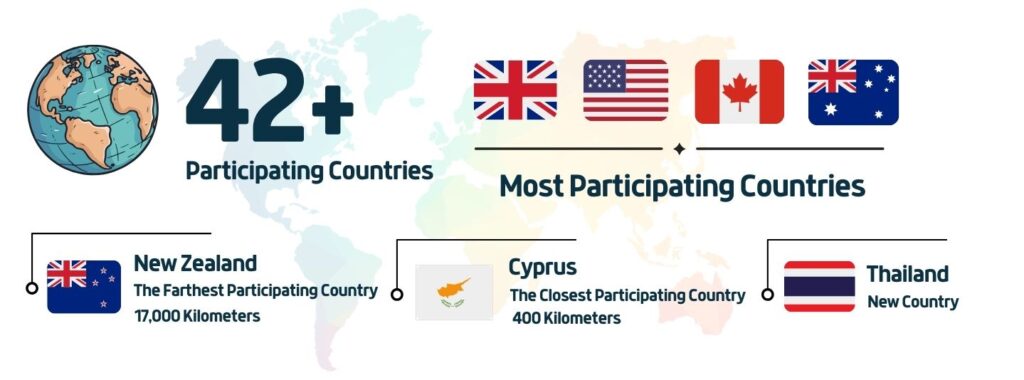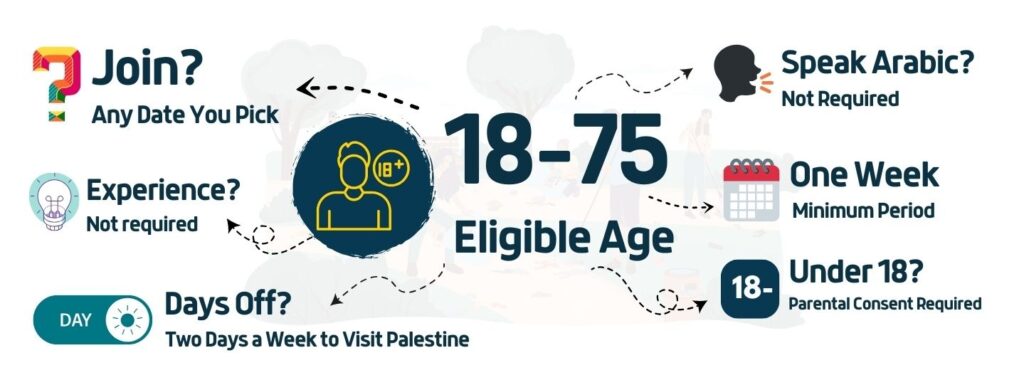

The Palestine-Israel Conflict And Refugees Internship gives you a rare chance to explore the refugee situation in the West Bank. You’ll visit refugee camps in Hebron and meet local families. Hear real stories of displacement and listen to elderly residents share their memories. Through field trips, you’ll gain a deeper understanding of life in the camps. This program offers firsthand insight into both the conflict and the refugee crisis.
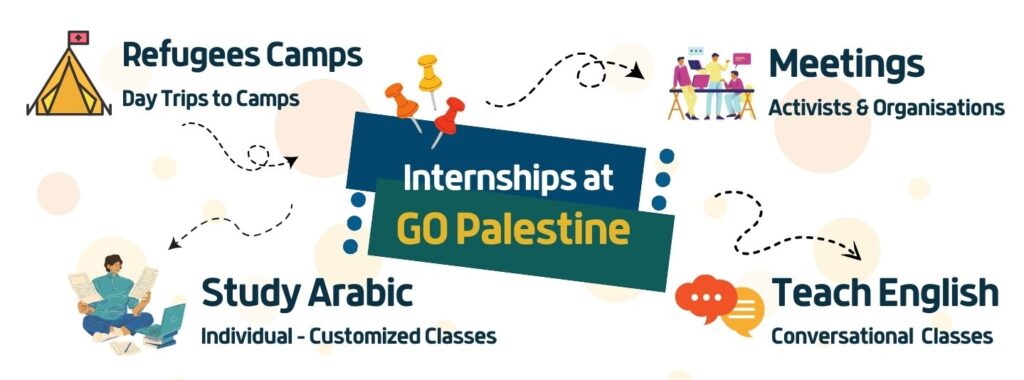
Where does the Palestine-Israel Conflict & Refugees Internship take place?
It takes place in the heart of Palestine, in the city of Hebron. Hebron, Al-Khalil in Arabic, is located in the southern part of the West Bank. It is 30 km (19 miles) south of Jerusalem. The population of Hebron is about 300,000 persons who reside in the city, and about another 500,000 who live in the surrounding villages.
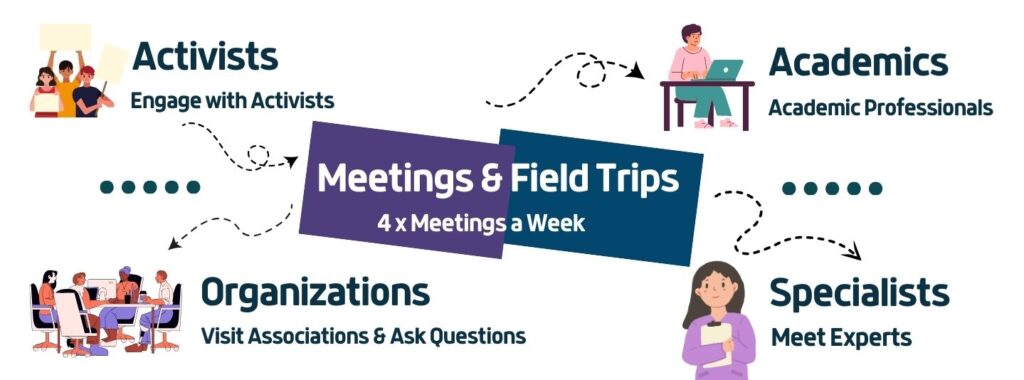
How long can I participate in the Palestine-Israel Conflict And Refugees Internship?
The Palestine-Israel Conflict And Refugees Internship is flexible. You can join for one week or up to 12 weeks. Whatever you choose, we’ll support you every step of the way. Our goal is to make sure you have a great, meaningful experience in Hebron.
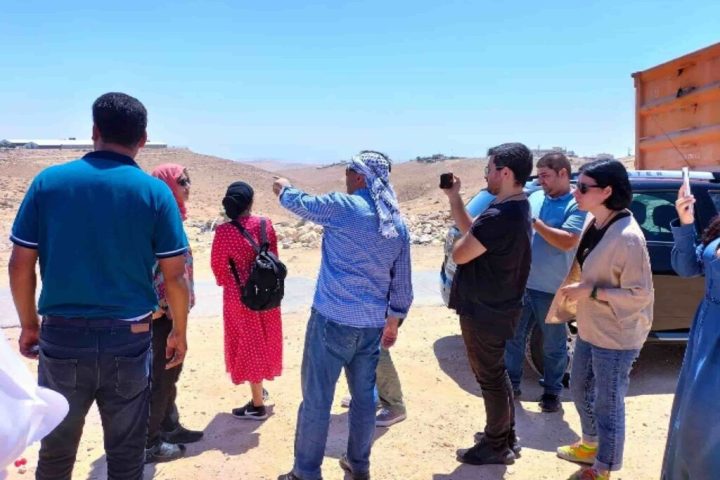
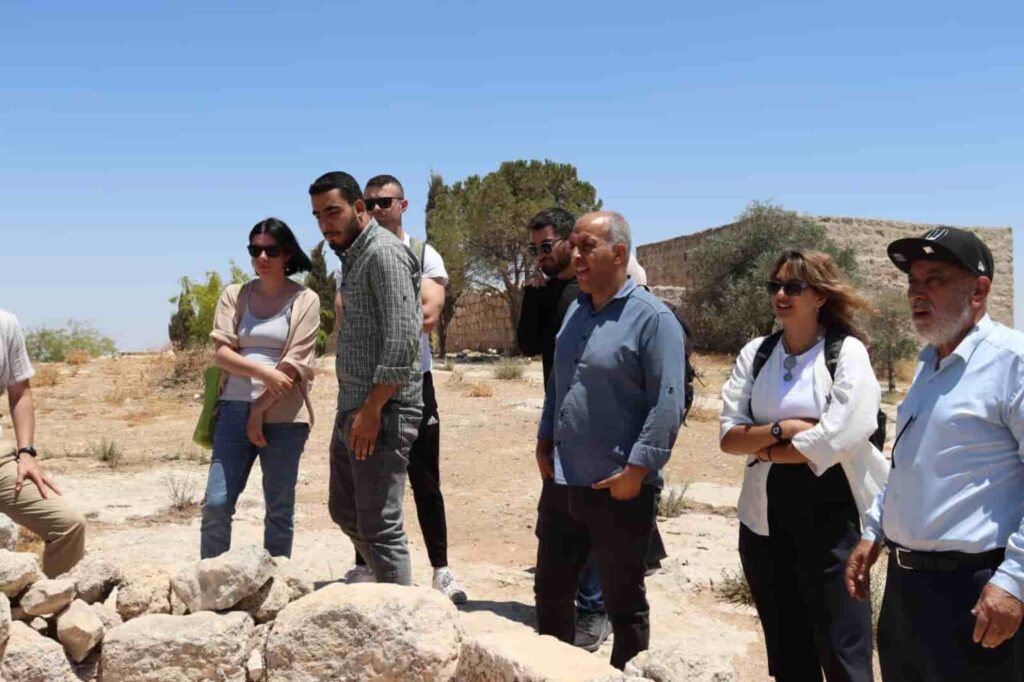



Is there a specific day I need to start the program?
The Palestine-Israel Conflict And Refugees Internship offers complete flexibility with start dates. There’s no need to begin on a specific day of the week. You can start on a Saturday, Monday, Thursday—or any day that fits your plans. The program is designed to work around your schedule, not the other way around.
We understand that everyone has different needs, so you’re welcome to choose the start date that suits you best. Whether you’re planning in advance or joining last-minute, the Palestine-Israel Conflict And Refugees Internship gives you the freedom to begin your experience when you’re ready.
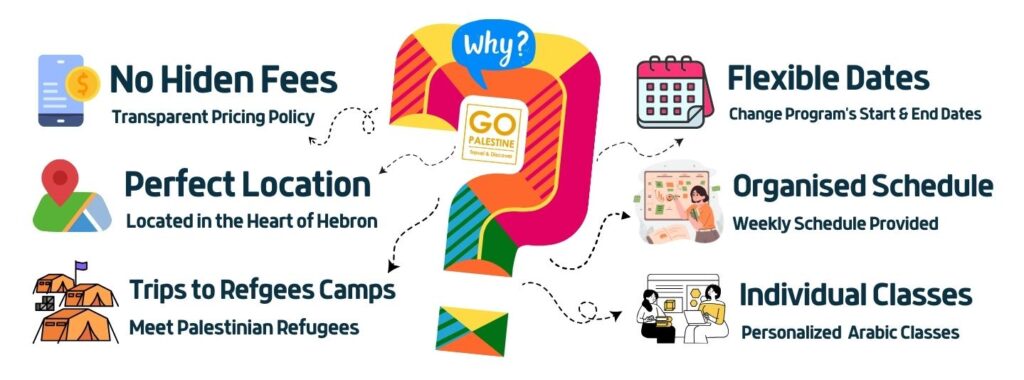
The Benefits of the Palestine-Israel Conflict And Refugees Internship Program
- As part of the Palestine-Israel Conflict and Refugees Internship, you will meet organizations, field researchers, and camp residents and families. This direct engagement will offer valuable insights into the experiences of those living in the camps and the work being done to address their challenges.
- You will meet with the Palestinian people who live in areas within the city of Hebron that are under Israeli control named “H1” who is a particularly strong example of those suffering from the occupation policies, as well as being routinely harassed by Israeli settlers.
- A participant will have the opportunity to organize workshops on a topic related to the program; or present workshops that teach a variety of skills, such as academic writing, writing biography, drawing, first aid, theater, music, and other skills.
- The participant will engage in the Palestinian community, culture, and daily life.
- Participants will be visiting city historical sites.
- Day Trips to refugee camps in Hebron & Bethlehem and some areas of political importance.
- All participants will receive 3 hours of Arabic language lessons per week.
- Accommodation is provided for the length of the program, either residing with a Palestinian host family or at our 8th-floor apartment. Private accommodation is also available with extra fees.
- A Palestinian breakfast is provided every day and enjoyed with other international volunteers and staff.

Origins of the Israeli-Palestinian Conflict
- The Israeli-Palestinian conflict refers to the ongoing political and military tensions between Israel and several Arab nations.
- Its roots trace back to the late 19th century with the rise of Zionism and Arab nationalism. Palestinians regard Palestine as their ancestral homeland, inhabited for thousands of years. In contrast, Zionist Jews view the land as divinely promised to them, as stated in biblical texts.
- The conflict between Israeli Jews and Palestinian Arabs escalated in the early 20th century, reaching a turning point in 1947 with a war that involved widespread displacement and the forced expulsion of Palestinians from their villages and towns. This culminated in the first Arab-Israeli war in May 1948, following the declaration of the State of Israel.
Who are the Palestinian Refugees?
According to the United Nations Relief and Works Agency (UNRWA), Palestinian refugees are individuals who lived in Palestine between June 1946 and May 1948 and were displaced, losing their homes and livelihoods as a result of the 1948 war.
Today, over 1.4 million registered Palestinian refugees—approximately one-third of the total refugee population—reside in 58 officially recognized camps across Jordan, Lebanon, Syria, the Gaza Strip, and the West Bank, including East Jerusalem.
In response to the aftermath of the June 1967 war and Israel’s occupation of the West Bank and Gaza Strip, ten additional camps were established to shelter a new wave of displaced Palestinians, including both refugees and non-refugees.
The land where these camps are located is generally either government-owned or leased by host governments from private landowners. While refugees do not own the land their homes are built on, they are granted the right to use it for residential purposes.
In the Hebron area, two prominent refugee camps provide shelter and community services:
- Al-Arroub Camp: Established in 1949, it lies 15 km south of Bethlehem and 35 km south of Jerusalem, north of Hebron.
- Al-Fawwar Camp: Located 8 km south of Hebron, it was named after Ain al-Fawwar, a spring in the nearby town of Dura.
Both camps stand as enduring symbols of the displacement and ongoing struggles faced by Palestinian refugees.

What Else Can I Do as an Intern ? (Optional)
- As part of the Palestine-Israel Conflict and Refugees Internship, you’ll also have the opportunity to share your expertise by organizing workshops, seminars, or lectures on topics you’re passionate and knowledgeable about. Whether held at the University of Hebron or at our center, we’ll fully support you in coordinating all necessary arrangements. This platform allows you to engage meaningfully with the local community, exchange ideas, and contribute to important conversations surrounding the conflict, human rights, or any area you wish to highlight during your time in Palestine.
- We will connect you with the University or organize the event at our center, targeting local Palestinian participants. These workshops can run for one, two, or three days—or any timeframe that fits your schedule. We’ll handle announcements, logistics, and participant coordination, allowing you to focus on preparing your materials.
- Our center is fully equipped with everything you might need, including a screen, projector, whiteboard, laptop, and more. You’ll have all the support required to deliver an impactful and engaging session.

200+ Reviews from Past Participants – Gold verified by Go Overseas!
To learn more about the experiences of participants with “Go Palestine,” you can explore reviews on well-known platforms such as Go Overseas and GoAbroad. The organization has consistently received over 200 positive reviews on both websites combined from volunteers and interns worldwide.

These testimonials highlight the exceptional quality and depth of the Palestine-Israel Conflict and Refugees Internship, as well as other programs offered by Go Palestine. They reflect the enriching cultural exchange opportunities, immersive learning experiences, and lasting impact the programs have on participants.
Whether you’re joining for an internship, volunteering, or Arabic language courses, these firsthand accounts provide valuable insight into the organization’s commitment to creating transformative and meaningful experiences for all who participate.





What does your weekly schedule look like?
At GO Palestine, we are dedicated to crafting a weekly schedule for the Palestine-Israel Conflict and Refugees Internship that is both enriching and well-balanced. Your schedule will be thoughtfully designed to include a mix of educational, cultural, and social activities.
From insightful field visits and interactive sessions to engaging cultural experiences and community gatherings, every week is curated to provide you with a unique and meaningful experience in Palestine. Our goal is to ensure your time here is not only informative and impactful but also enjoyable and deeply memorable.
Breakfast starts at 9:30 am
The day at our center starts with a special Palestinian breakfast at 9:30 in the morning and ends at approximately 10:15. Our breakfast contains a number of ingredients, including Palestinian thyme (Zaatar), labneh, tomato and cucumber slices, falafel, hummus, mortadella, olives, yellow cheese, jam, pita bread, boiled or fried eggs, and French fries. The ingredients are changed (among the mentioned ingredients) from time to time to diversify the breakfast.
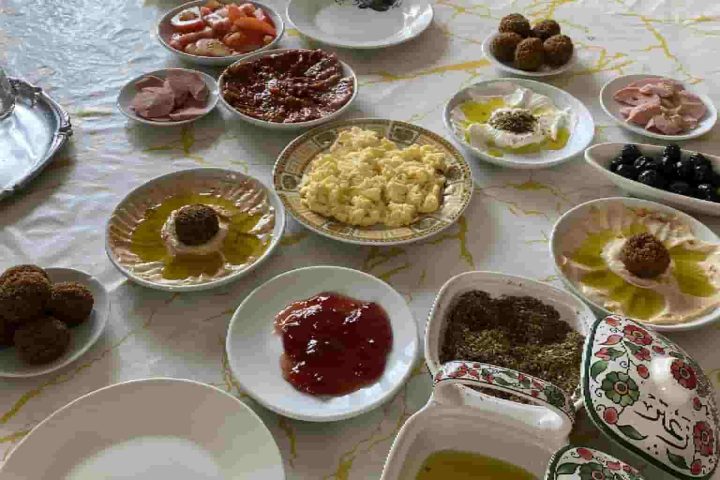
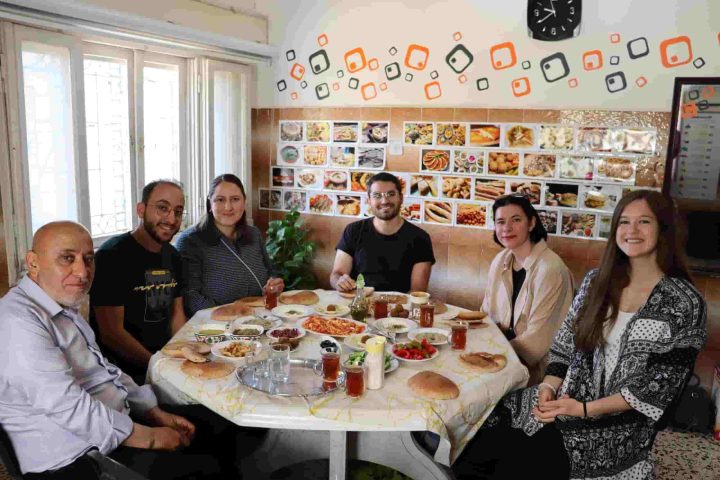
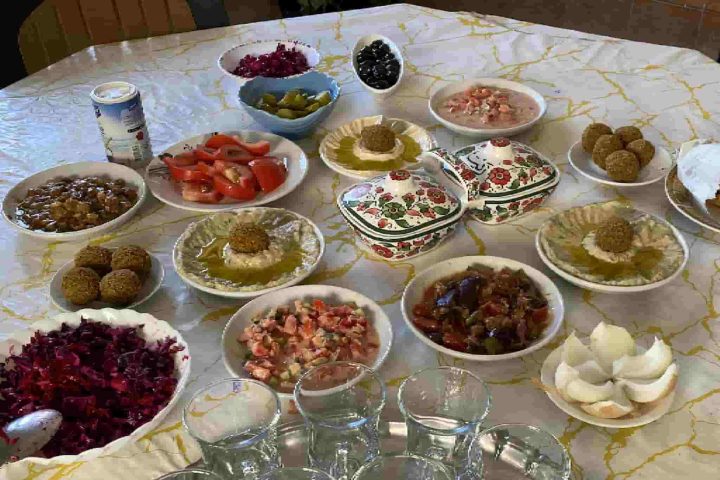
The Content of the program starts at 10:30
The content of your Palestine-Israel Conflict and Refugees Internship program begins at 10:30 in the morning and continues until 1:30 or 2:00 in the afternoon. This may include field visits, meetings with various institutions related to the program, or teaching conversational English to Palestinian students. The specific activities will vary depending on the program you are joining.
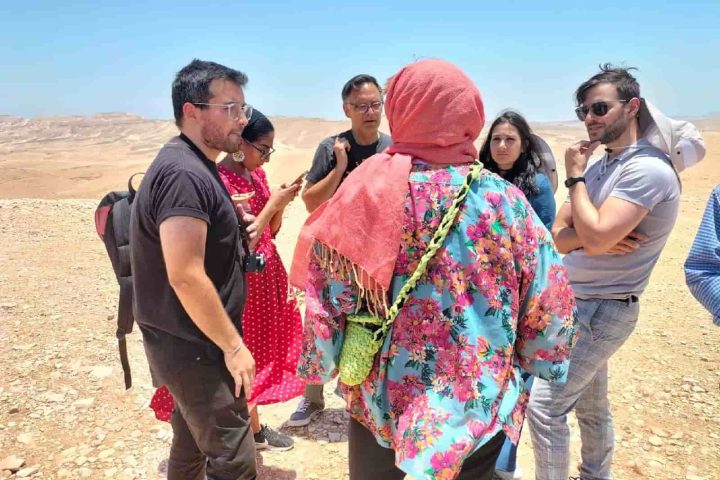

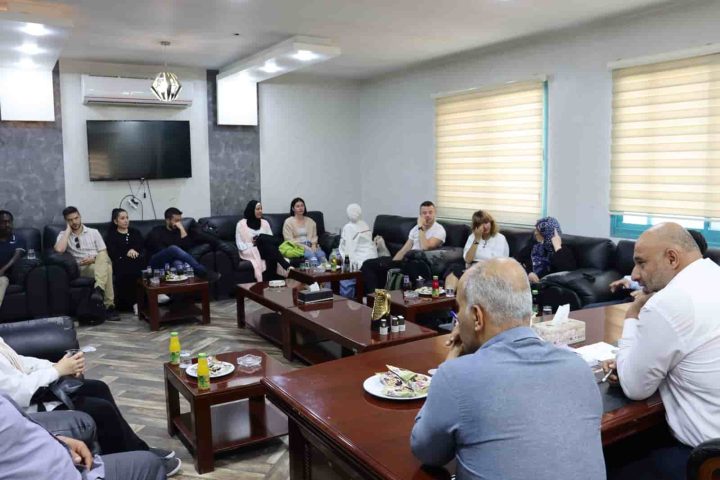
Lunch Break starts at 2:00 pm
At two o’clock in the afternoon begins the lunch break, which lasts for an entire hour. You can buy lunch from a restaurant next to the center. There are a number of restaurants nearby, which provide meals such as shawarma, falafel, and fried chicken as well as traditional Palestinian meals such as Maqluba, Hebron’s Qidreh, Chicken Mansaf or Lamp Mansaf, and other meals. There are also a number of supermarkets/malls nearby where you can buy what you need and cook yourself in the center.

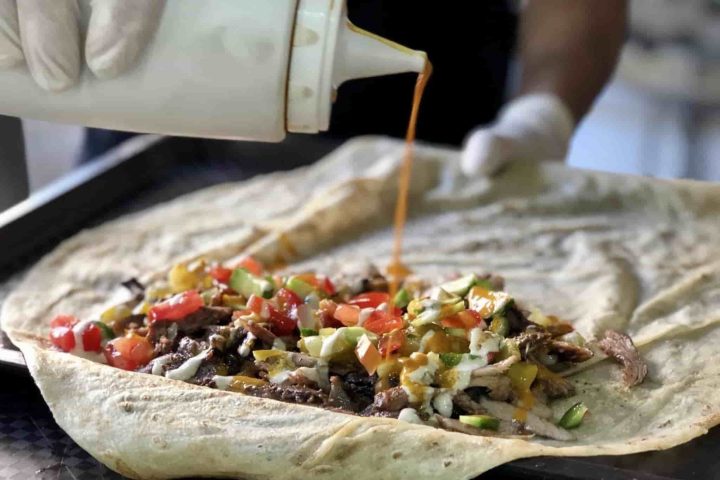
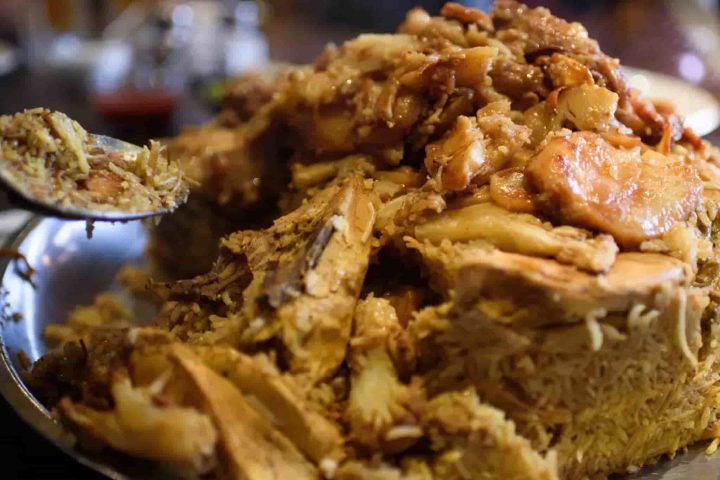
Arabic Language Classes (MSA and Levantine/Colloquial)
Weekly, you will get two Arabic language classes for an hour and a half each. These classes are taught by one of our skilled/qualified teachers. Arabic language classes are held at different times, either in the morning or, in most cases, in the afternoon. The student can choose whether to study Modern Standard Arabic, Colloquial Arabic (Ammiya), or both.
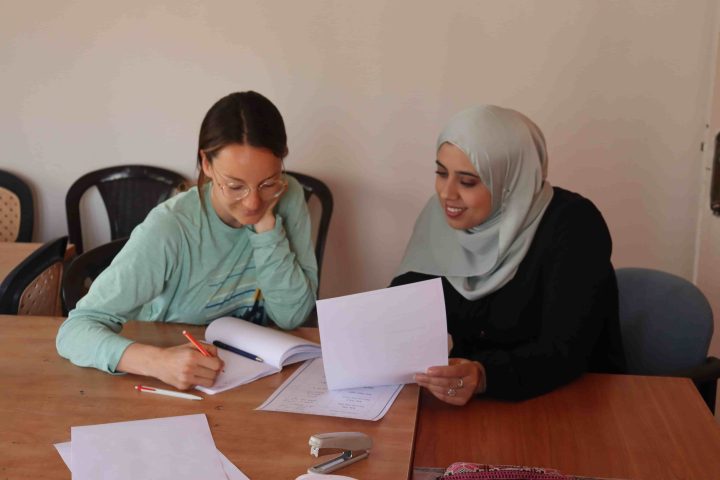
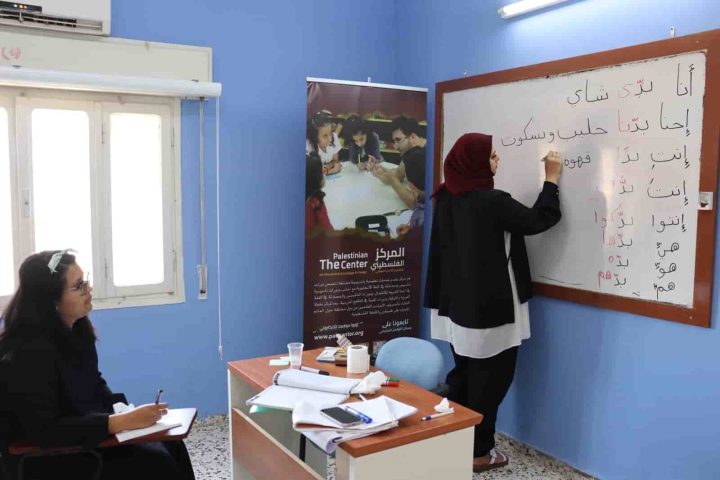

Day Trips to Refugee Camps in Bethlehem & Hebron
Once every week, a day trip is organized as part of the Palestine-Israel Conflict and Refugees Internship to the refugee camps in Hebron and Bethlehem, as well as to areas of political importance whenever the opportunity arises. These trips will give you the opportunity to learn about the conditions of the Palestinian refugees, talk to them, and hear their stories. The trips depart at 10:45 am from the center and end approximately at 2:00 or 3:00 in the afternoon.
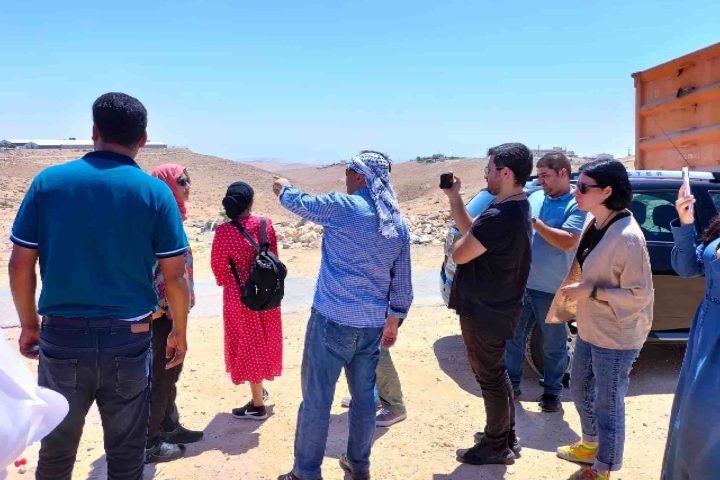

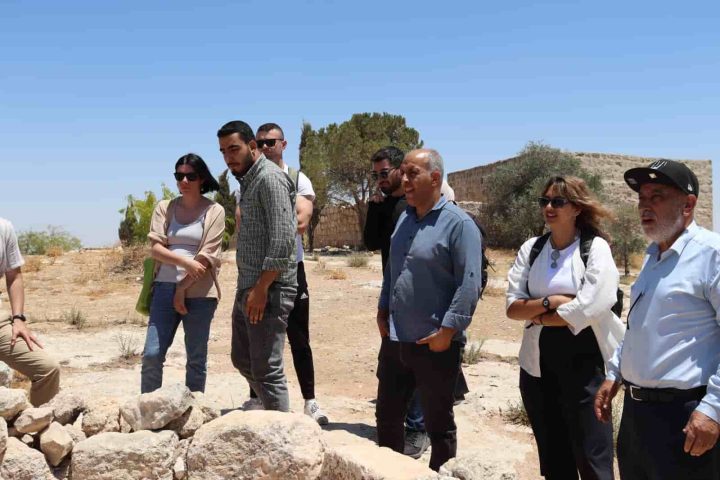
Local Visits to Learn about the Landmarks of the city of Hebron
Once every two weeks, local visits are organized as part of the Palestine-Israel Conflict and Refugees Internship to the historical and economic landmarks of the city of Hebron. This includes visits to the Ibrahimi Mosque, the Old City, Al-Shuhada Street, as well as tours of local factories such as those producing keffiyehs, glass, and ceramics. These visits provide valuable insights into the city’s rich history and economy.
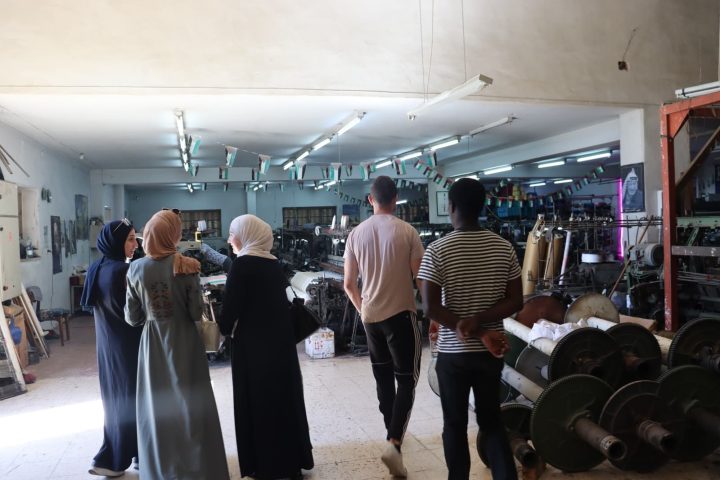
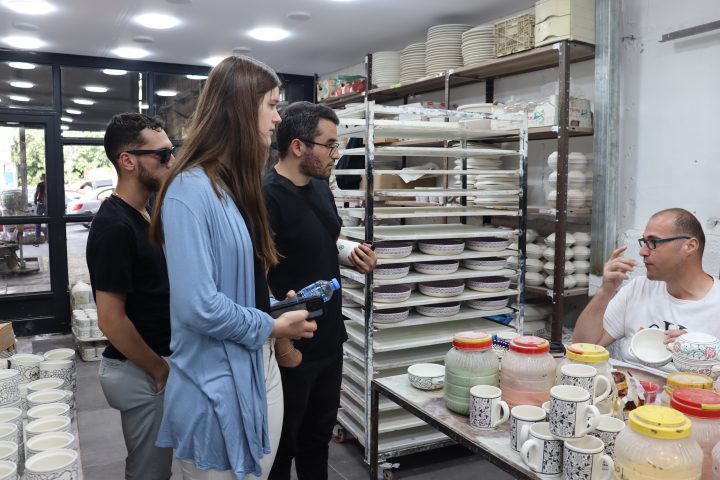

Prepare & Cook a Traditional Palestinian Dish
Once every two or three weeks, all our volunteers, interns, and Arabic language’ students join together to prepare and cook a traditional Palestinian dish. This includes preparing appetizers, frying vegetables, cooking rice, chopping chicken or meat, and stuffing some vegetables depending on the dish to be cooked that day.
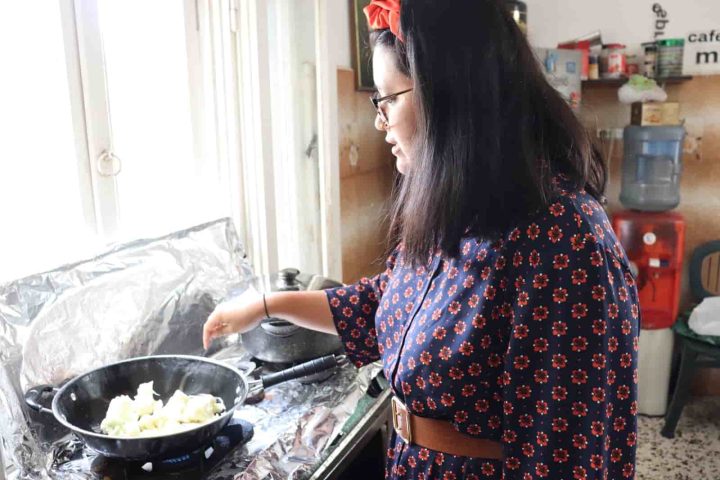
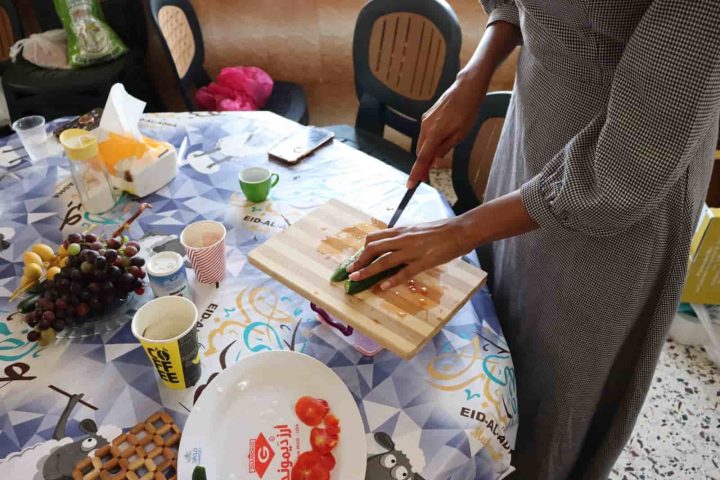
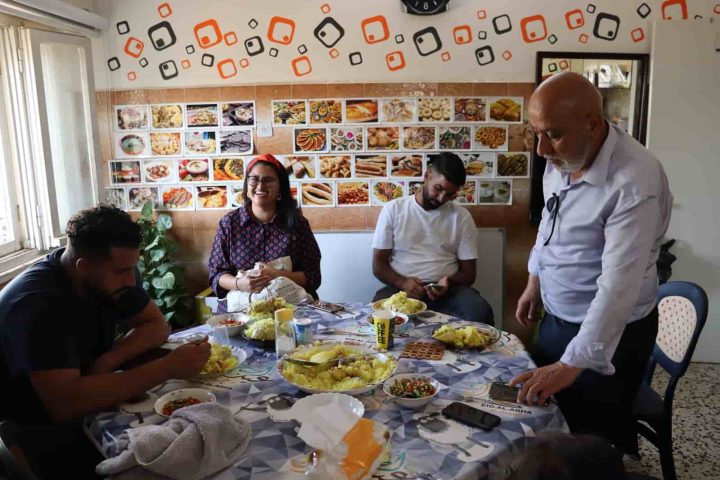
Free Time starts at 16:00 or at 16:30
After your time in the center is over, you have free time where you can hang out with other international participants and/or locals you met during your stay in Hebron by going to a café or coffee shop or going to a park and enjoying your time in the evening. There are many cafes and parks not far from the center, as the center is located on one of the most lively streets in the city.
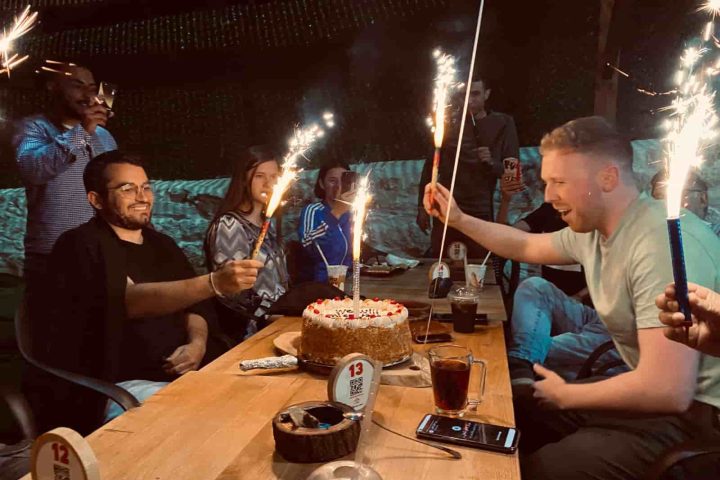
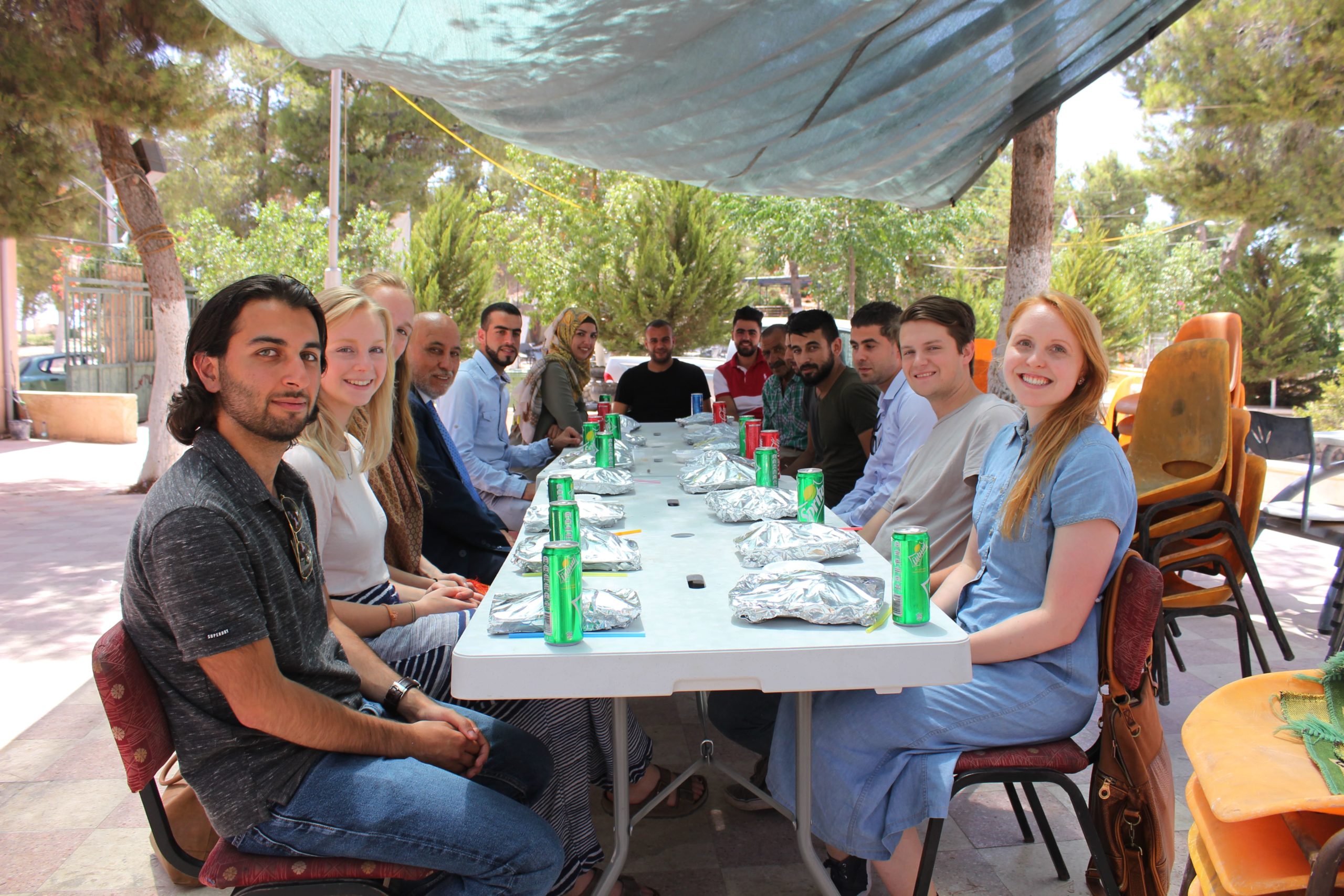


The Palestine-Israeli Conflict And Refugees Internship Fees

350$
American DollarsThis includes accommodation, local visits, 3 hours of Arabic classes, daily Palestinian breakfast, day trips, and a certificate of participation.
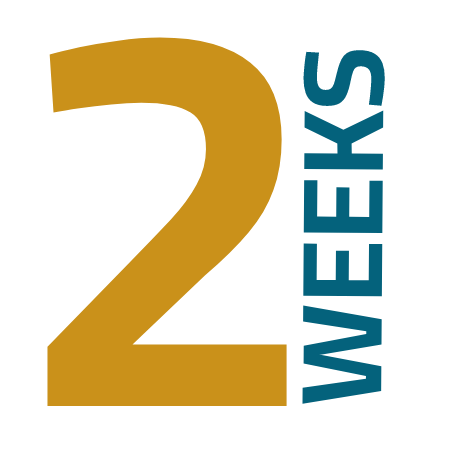
690$
American DollarsThis includes accommodation, local visits, 6 hours of Arabic classes, daily Palestinian breakfast, day trips, and a certificate of participation.
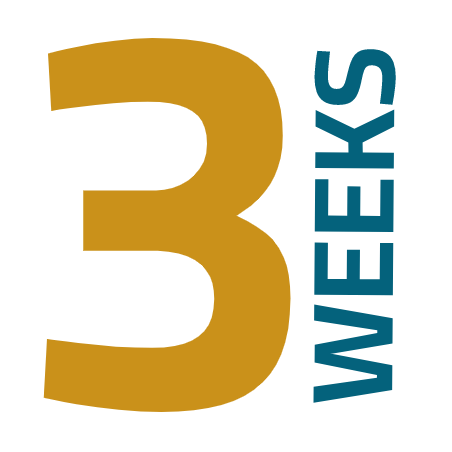
965$
American DollarsThis includes accommodation, local visits, 9 hours of Arabic classes, daily Palestinian breakfast, day trips, and a certificate of participation.

1200$
American DollarsThis includes accommodation, local visits, 12 hours of Arabic classes, daily Palestinian breakfast, day trips, and a certificate of participation.

1500$
American DollarsThis includes accommodation, local visits, 15 hours of Arabic classes, daily Palestinian breakfast, day trips, and a certificate of participation.
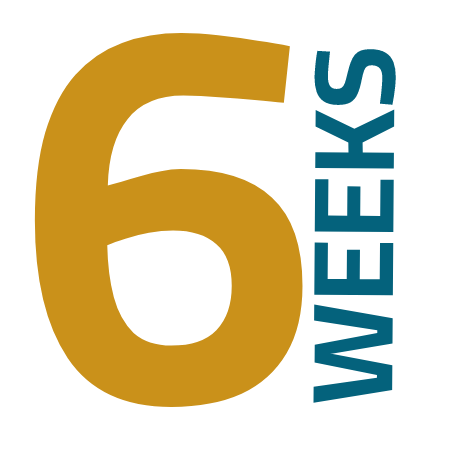
1750$
American DollarsThis includes accommodation, local visits, 18 hours of Arabic classes, daily Palestinian breakfast, day trips, and a certificate of participation.
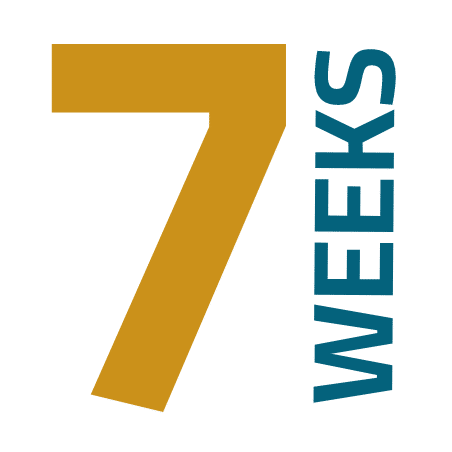
1950$
American DollarsThis includes accommodation, local visits, 21 hours of Arabic classes, daily Palestinian breakfast, day trips, and a certificate of participation.

1990$
American DollarsThis includes accommodation, local visits, 24 hours of Arabic classes, daily Palestinian breakfast, day trips, and a certificate of participation.
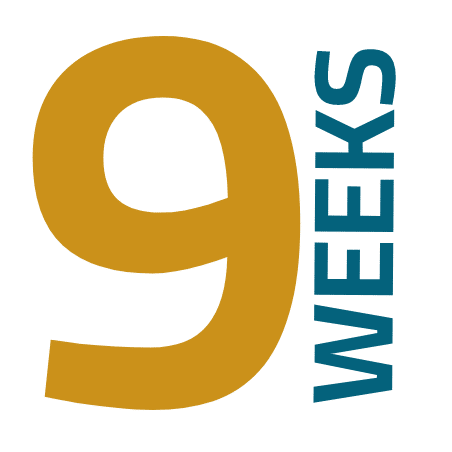
2500$
American DollarsThis includes accommodation, local visits, 27 hours of Arabic classes, daily Palestinian breakfast, day trips, and a certificate of participation.
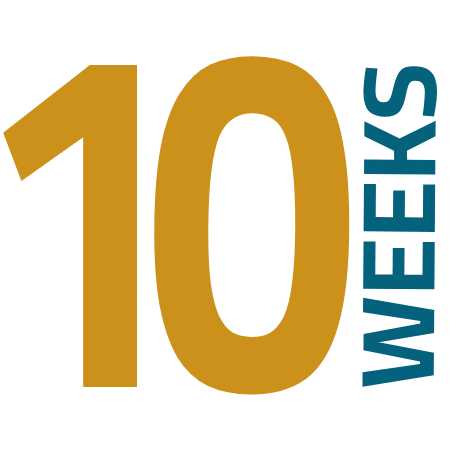
2750$
American DollarsThis includes accommodation, local visits, 30 hours of Arabic classes, daily Palestinian breakfast, day trips, and a certificate of participation.
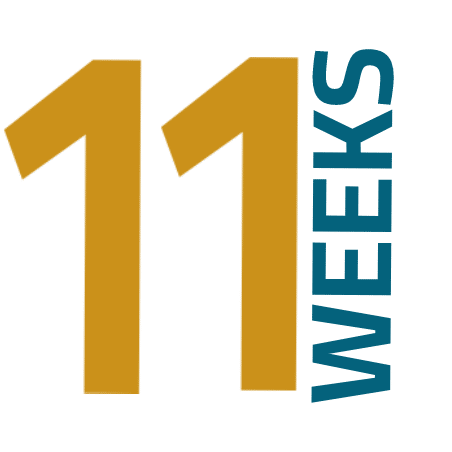
2950$
American DollarsThis includes accommodation, local visits, 33 hours of Arabic classes, daily Palestinian breakfast, day trips, and a certificate of participation.

3150$
American DollarsThis includes accommodation, local visits, 36 hours of Arabic classes, daily Palestinian breakfast, day trips, and a certificate of participation.
What does the Participation Fee include?
| Accommodation | Host family or at our 8th-floor apartment Private accommodation is available with extra fees |
| Feild Visits/Meetings | To visit organizations/field researchers, as well as camp residents & families living in H2 area in Hebron. |
| Arabic Lessons | 3 Hours a Week – Two Classes/ 1,5 hours each. |
| Meals | Daily Palestinian breakfast at the center |
| Day Trips | To Refugees camps in Hebron & Bethlehem & some areas of political importance |
| Sightseeings in Hebron | Historical & politically important sites in Hebron and Hebron factories. |
| Certificate of Participation | Certificate of participation & recommendation letter at the end of the program |

Navigation Guide : Navigate with Ease

When Should You Arrive to Start Your Program?
For the Palestine-Israel Conflict and Refugees Internship, we recommend that you plan to arrive in Palestine at least one day before your selected start date. This extra day will give you time to settle in, get comfortable in your new surroundings, and prepare yourself for the meaningful experiences ahead.
Similarly, we suggest staying an additional day after the program concludes to allow for a smooth, stress-free departure. These extra days help ease your transition in and out of the program, ensuring that your journey begins and ends on a calm and organized note.
What Visa Do You Need to Intern in Palestine?
To participate in the Palestine-Israel Conflict and Refugees Internship, you will need to obtain an Israeli tourist visa, which typically allows you to stay in the region for up to three months. Since Israel controls all borders and entry points, securing an internship-specific visa directly through Palestinian channels is not currently feasible. Therefore, the tourist visa is the most practical and commonly used option for international interns joining programs in Palestine.
Visa Requirements for Palestine
If you’re planning to join the Palestine-Israel Conflict and Refugees Internship and you’re from a country that has a visa exemption agreement with Israel, you can typically receive a tourist visa upon arrival. This is possible at entry points such as Ben Gurion Airport in Tel Aviv or the Allenby-King Hussein Bridge border crossing. Citizens of countries like the United States, Canada, Australia, and many European nations are usually granted a three-month visa on arrival, making the process relatively smooth and hassle-free.
If your country doesn’t have an exemption agreement, you’ll need to get a visa from the Israeli embassy or consulate in your home country before traveling. Israel now issues visas on a separate card with a barcode to avoid passport stamps, as some Arab countries do not accept Israeli passport stamps. Be sure to check if your country participates in a visa exemption agreement.
What If Your Passport Isn’t Suitable for a Tourist Visa?
If you’re planning to join the Palestine-Israel Conflict and Refugees Internship and you’re from a country like Pakistan or India, it’s important to know that you’ll need to apply for a visa through the Israeli embassy in your home country before traveling.
This step is mandatory, as Israel controls all points of entry into Palestine. While the visa process can be challenging and time-consuming, it is a crucial part of your preparation. We recommend starting the application as early as possible and gathering all required documentation to avoid delays in joining the program.
Is the West Bank Safe for Interning?
Yes, the West Bank is generally considered safe for interning, especially in the areas where Go Palestine operates its programs. Most incidents or unrest tend to occur in locations that are far from the main urban centers. Cities like Hebron, Bethlehem, and Ramallah—where the Palestine-Israel Conflict and Refugees Internship and other programs take place—are known to be stable and welcoming to international participants.
At Palestine-Israel Conflict and Refugees Internship, we prioritize your safety by maintaining close contact with local authorities and communities to ensure a secure and supportive environment throughout your stay. Interns often find the local community welcoming and supportive, which contributes to a sense of security. However, we recommend staying updated on local news and following any safety advice from your hosts to ensure your well-being.
Is Prior Experience Required to Intern in Palestine?
No prior experience is required to take part in the Palestine-Israel Conflict and Refugees Internship or any of our other programs. We welcome participants from all backgrounds and levels of experience, whether you’re a student, recent graduate, or simply someone passionate about learning and contributing. Our goal is to create a supportive, inclusive, and enriching environment where everyone can engage meaningfully, develop new skills, and make a positive impact—regardless of previous academic or professional history.
What matters most is your enthusiasm and dedication. Our team will be with you every step of the way, whether you’re experienced or just starting out. We invite you to join us in making a positive impact in this remarkable region.
Do I Need to Know How to Speak Arabic?
No, knowing Arabic is not a requirement to join the Palestine-Israel Conflict and Refugees Internship or any other program at Go Palestine. Interns will receive three hours of Arabic lessons each week, taught by one of our experienced teachers.
Once your program begins, you’ll have the option to choose between Modern Standard Arabic (Fusha) or Spoken Arabic (Ammyia), depending on your goals and interests. These lessons are designed to help you navigate daily life, enhance your cultural experience, and engage more meaningfully with the local community.
Can I Add More Arabic Lessons to My Program?
Yes, you can absolutely enhance your Palestine-Israel Conflict and Refugees Internship by adding extra Arabic lessons to your program. These optional additional lessons are available at a rate of $20 per hour and are a great way to deepen your understanding of both the language and culture.
Whether you want to strengthen your conversational skills or delve further into grammar and vocabulary, these one-on-one Arabic sessions can be tailored to your needs. If you’re interested in this option, just mention it in your Palestine-Israel Conflict and Refugees Internship application, and we’ll ensure everything is arranged for you in advance.
| Place of Program | Hebron (H1 – Under Palestinian Control), Palestine |
| Age | 18-75 Years Old |
| Minimum Period | One Week |
| Maximum Period | Three Months – 12 Weeks |
| Interning Hours | 4-5 hours a day – 5 days a week |
| Starting/Ending Dates | Flexible – Anytime |
| Application Deadline | No Deadline |
| Program Language | English |
| Days off | Two days including Fridays & Thursdays or Saturdays |
| Arabic Lessons | 3 Hours a Week – Standard Arabic Or Ammiya |
| Educational Degree | Not Required |
| University Credit | Available |
Is it possible to combine this program with another Program?
Yes, this program can be combined with one or more of the other internship or volunteer programs that the center offers. For example, you may choose one week or more to complete this program, and combine this with another week or more of another program.
Can I Extend My Program While I’m There?
Yes, it is definitely possible to extend the duration of your Palestine-Israel Conflict and Refugees Internship while you are in Palestine. If you feel inspired to stay longer and continue your journey, you’re more than welcome to extend your participation. To ensure everything runs smoothly, we kindly ask that you inform the center coordinator at least one week before your current program ends.
This gives us enough time to make all the necessary arrangements for your extended stay—whether it’s updating your schedule, coordinating accommodations, or adjusting your activities. We encourage you to reach out to the coordinator early on to discuss your plans and confirm the details, so we can continue supporting your experience in the best way possible.
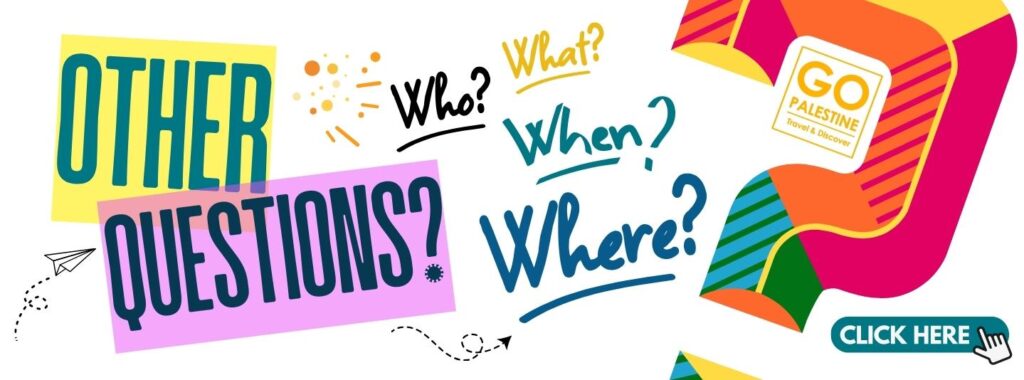
Things to know before visiting Palestine!
| Living Costs in Palestine | Approx. 50-70$ a Week |
| Weekend in Palestine | On Friday |
| Food in Palestine | The West Bank engages primarily in heavier meals involving the use of bread, rice, and meat, and coastal plain inhabitants frequent fish, other seafood, and lentils. |
| Wifi Access in Palestine | At houses, cafes, restaurants – Almost everywhere |
| 3G Service in Palestine | Available since Jan 2018 |
| The official language in Palestine | Arabic – Palestinian Dialect (One of the Levantine dialects) |
| Currency in Palestine | Mainly Israeli Shekel (NIS). Jordanian Dinar & American Dollars are also used in buying Real estate and land. |
| Transportations in Palestine | Yellow Taxies & Orange Mini-Vans |
| Weather in Palestine | Summer (25-30°C), Winter (0-9°C) |
| Nearest Major Airports to Palestine | Ben Gurion Airport in Israel if you travel via Israel Alia International Airport if you travel via Jordan |
The Documents you’ll receive from us!
When you join the Palestine-Israel Conflict and Refugees Internship, you’ll receive a comprehensive set of documents to help ensure a smooth, well-informed, and stress-free experience. Among these resources is our specially prepared travel guide, which provides step-by-step instructions on how to reach us in Hebron.
This guide includes essential information about the most efficient and reliable transportation options, directions from major entry points like Tel Aviv or the Allenby Bridge, and helpful travel tips tailored to international participants. We’ve designed it to make your arrival as convenient and seamless as possible, so you can focus on getting the most out of your internship from the moment you land.
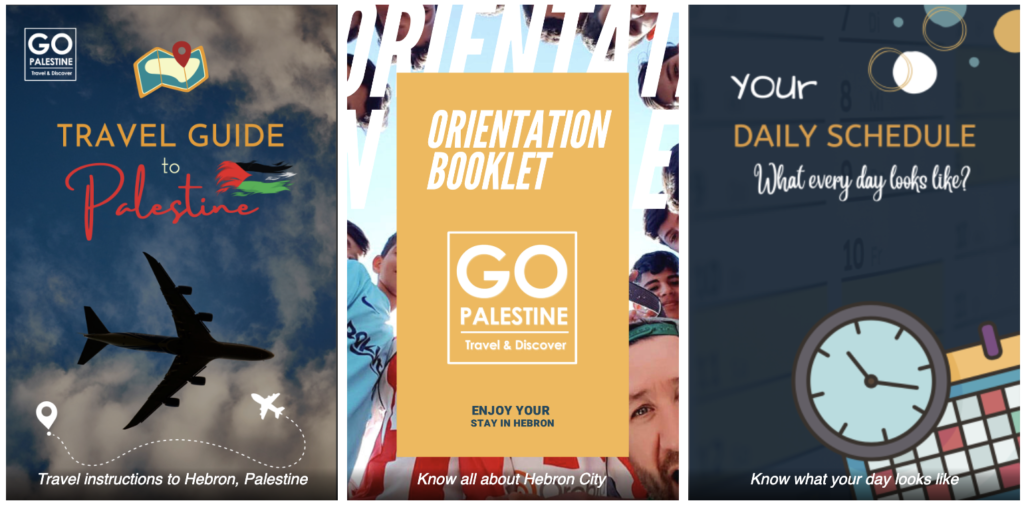
In addition, we’ll provide you with a weekly schedule booklet, which outlines the activities and events planned for each day of your program. This will help you organize your time and ensure that you make the most of every opportunity. To further enrich your experience, you’ll also receive an orientation booklet.
This booklet is designed to help you get familiar with the local culture and surroundings, offering valuable insights into life in Hebron. It will provide you with a deeper understanding of the city’s history, traditions, and unique atmosphere, ensuring that you feel more connected to the place during your stay.

What can be added to your program? “Add-ons“
- Private apartment available as an add-on for $200 per week or $600–$700 per month.
Would you like to join an online Arabic course before joining us?
Learning Arabic before your arrival for the Palestine-Israel Conflict and Refugees Internship can greatly enhance your experience in Palestine. Familiarizing yourself with basic Arabic phrases and cultural expressions will help you feel more confident when communicating with locals, navigating everyday situations, and engaging with the local culture.
By making an effort to understand the language, you’ll be better equipped to connect with people, enrich your interactions, and fully immerse yourself in the rich Palestinian culture, making your time in Palestine even more meaningful and rewarding.

We’re excited to offer you the chance to start this journey with a free trial, which includes your first class completely free! This is a great opportunity to get a taste of the Arabic language and see how it can enrich your time in Palestine. Click Here for more information!
Please email Mr.Tamimi, at info@gopalestine.ps. Please type “ The Palestine-Israel Conflict and Refugees Internship Program” in the subject line. In the body of the email, ask any questions you may have, and request an application. Very shortly, we will reply to you.
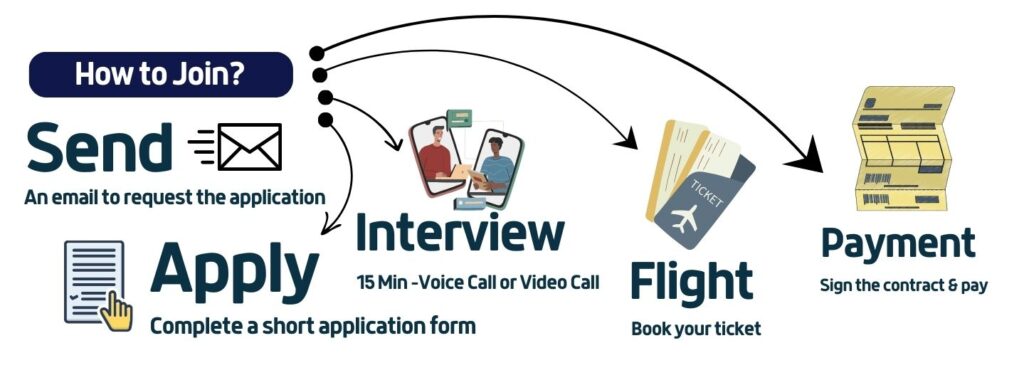
What is the procedure for applying?
| Step 1 | Send us an email asking for the application form. |
| Step 2 | You complete the online application and send it in. |
| Step 3 | We invite you to participate in an interview via WhatsApp, Zoom, Google Meet (video or voice call). |
| Step 4 | We will send you a confirmation form which you fill out and return to us. |
| Step 5 | We send you the Invitation Letter, the contract and the invoice. |
| Step 6 | You will sign the contract and make payment in order to reserve your place in the program. |
| Step 7 | We will send you an orientation booklet and travel guide to Palestine. |
Fast-Track Application – Within 3 days!
If you’re looking to join us next week or need to make arrangements on short notice, we’ve got you covered with our convenient fast-track application process for the Palestine-Israel Conflict and Refugees Internship. This streamlined option is designed to save you time and make it easy for you to get started.

With this process, you can quickly book your flight, submit your application, attend a personalized interview, pay the necessary fees, and secure your place—all within just three days. Whether you’re in a hurry or simply excited to begin, our fast-track system ensures a smooth and efficient onboarding experience for the Palestine-Israel Conflict and Refugees Internship.


